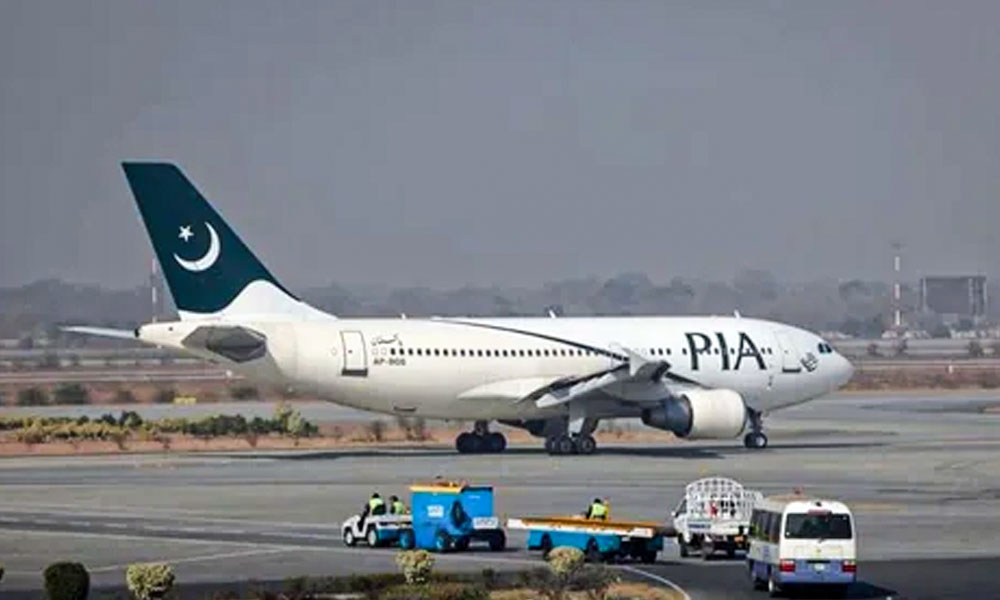Business
Pakistan Airlines suspends Afghan operations citing IEA interference

Pakistan International Airlines (PIA) suspended flights to the Afghan capital, Kabul, on Thursday after what it called heavy handed interference by Islamic Emirate of Afghanistan (IEA) authorities.
The suspension took place after the IEA government ordered the airline, the only international company operating regularly out of Kabul, to cut ticket prices to levels seen before the fall of the Western-backed Afghan government in August.
“We are suspending our flight operations to Kabul from today because of the heavy handedness of the authorities,” a spokesman told Reuters.
Earlier, the IEA warned PIA and Afghan carrier Kam Air that their Afghan operations risked being blocked unless they agreed to cut ticket prices, which have spiralled to levels out of reach for most Afghans.
With most airlines no longer flying to Afghanistan, tickets for flights to the Pakistani capital, Islamabad, have been selling for as much as $2,500 on PIA, according to travel agents in Kabul, compared with $120-$150 before.
The Afghan transport ministry said in a statement prices on the route should “be adjusted to correspond with the conditions of a ticket before the victory of the Islamic Emirate” or the flights would be stopped.
It urged passengers and others to report any violations.
PIA, which runs chartered flights to Kabul rather than regular commercial services, said it had maintained the flights on “humanitarian grounds” and faced insurance premiums of as much as $400,000 per flight, Reuters reported.
“The insurance premiums on these flights are so high that it is simply impossible to operate scheduled flights to Kabul, as it is still considered a war zone by aircraft insurance companies and lessors,” the company said in a statement.
No comment was immediately available from Kam Air.
Business
Gold climbs to record high as tariff worries bolster safe-haven demand

Gold’s record run extended to another all-time high on Tuesday, buoyed by safe-haven demand as investors brace for U.S. President Donald Trump’s planned announcement on reciprocal tariffs.
Spot gold was up 0.3% at $3,131.56 an ounce at 0914 GMT, after hitting a record high of $3,148.88 earlier, Reuters reported.
U.S. gold futures were 0.3% higher at $3,159.10.
“Trump’s tariff comments and his increasingly volatile stance on Russia’s war against Ukraine are proving the perfect chaos for new record gold prices,” surpassing even the COVID pandemic five years ago, said Adrian Ash, head of research at online marketplace BullionVault.
Trump said on Sunday his reciprocal tariffs to be announced on Wednesday would include all countries, rather than a limited number.
Goldman Sachs on Monday raised the probability of a U.S. recession to 35% from 20% and said it expected more rate cuts by the Federal Reserve, as Trump’s tariffs roil the global economy and upend financial markets.
Gold, traditionally seen as a hedge against uncertainty and inflation, has risen more than 15% this year. Non-yielding bullion also tends to do well in a low interest rate environment.
“The market is watching April 2 closely for further economic indicators that could impact Federal Reserve policy decisions. If rate cuts are confirmed, this would provide additional support for gold’s upward trajectory,” said Alexander Zumpfe, a precious metals trader at Heraeus Metals Germany.
Bullion’s rally this year has also been supported by strong demand from central banks, geopolitical instability in the Middle East and Europe, and increased flows into gold-backed exchange-traded funds.
In the last session, gold closed out its strongest quarter since 1986, and climbed over $3,100/oz, marking one of the most significant upswings in the precious metal’s history.
Investors will also monitor U.S. job openings data later on Tuesday and the U.S. non-farm payrolls report on Friday.
Silver steadied at $34.06 an ounce, platinum fell 0.4% to $988.35, and palladium gained 0.3% to $985.86.
Business
Efforts underway to expand Afghanistan’s trade relations with India
A number of investors also suggest that the Islamic Emirate should actively participate in regional and trade fairs to increase exports, so that Afghan products can be marketed in regional and global markets.

The Ministry of Industry and Commerce says that efforts are underway to expand trade relations with India, the volume of which reaches $650 million annually.
Abdulsalam Jawad Akhundzada, a spokesman for the Ministry of Industry and Commerce, says that India is also interested in expanding trade relations with Afghanistan, and Kabul has also taken steps in this regard by using Chabahar Port, and talks have been held with the Indian side on visas.
The Chamber of Commerce and Investment also says that trade relations between Afghanistan and India are expanding and these relations are strengthening with each passing day. According to officials of the chamber, Afghanistan has exported goods worth $500 million to India in the past year.
A number of investors also suggest that the Islamic Emirate should actively participate in regional and trade fairs to increase exports, so that Afghan products can be marketed in regional and global markets.
According to investors, once the visa issues with India are resolved, a large portion of the country’s fresh and dried fruits will be exported to India because India is a good market for Afghan fruits in the region.
Investors want the Islamic Emirate to pave the way for increased exports to India through Chabahar Port.
Business
36 mining contracts inked over the past year: Mines ministry

The Ministry of Mines and Petroleum says it has signed 36 large and small mining contracts, with a total value of $1.3 billion over the past year.
Officials from the ministry stated that these contracts include 10 large mines, 25 small mines, as well as projects related to cement, salt, marble, and a major gas extraction contract with Uzbekistan, all signed with both domestic and foreign companies.
Meanwhile, economic experts have emphasized the importance of increasing investments in the mining sector for the country’s economic growth. They have stressed that priority in mining contracts should be given to domestic companies.
“It is better to prioritize domestic investors over foreign ones,” said Kamaluddin Kakar, an economic expert.
In the meantime, members of the private sector also stated that if both foreign companies and Afghan investors can partner in the mining sector, this will not only foster investment development in the country but also bring positive changes in capacity building within the mining extraction sector.
-

 Business4 days ago
Business4 days ago36 mining contracts inked over the past year: Mines ministry
-

 Latest News4 days ago
Latest News4 days agoDried fruit market in Herat booms ahead of Eid-al-Fitr
-

 Regional4 days ago
Regional4 days agoPowerful quake in Southeast Asia kills several, Myanmar declares state of emergency
-

 Latest News4 days ago
Latest News4 days agoUS may ask for military equipment left behind in Afghanistan: Trump
-

 International Sports4 days ago
International Sports4 days agoLucknow’s six-hitting machine Pooran justifies top order slot
-

 Latest News3 days ago
Latest News3 days agoMore than 70,000 Afghans returned home in third week of March: IOM
-

 Latest News4 days ago
Latest News4 days agoNegotiations with Afghanistan are the only way forward: Pakistan’s ex-PM Khan
-

 Health3 days ago
Health3 days agoGlobal organizations warn of health crisis due to aid cuts in Afghanistan
























